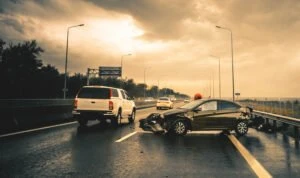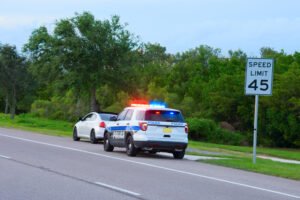
Florida’s hit-and-run laws are a critical component of the state’s traffic regulations, designed to ensure accountability and responsibility on the road. Understanding these laws is essential for all drivers in Florida. When an individual leaves the scene of a crash without fulfilling certain legal obligations, it constitutes a hit-and-run, a serious offense under Florida law. The importance of these laws lies in protecting the rights of all parties involved in traffic accidents and maintaining public safety. As a driver in Florida, knowing what to do in the event of a crash and being aware of the legal consequences of leaving the scene can help you make informed decisions and avoid severe penalties. If you are unsure what to do next, contact a skilled Florida criminal defense attorney immediately, such as those found here, at The Law Place.

Statistical Overview of Hit-and-Run Incidents in Florida
Hit-and-run incidents in Florida represent a significant portion of traffic-related offenses. According to recent statistics, these incidents show a concerning trend in the state. In cities like Orlando, FL, and others across the state, there’s been a notable increase in such cases over the years. These incidents range from minor property damage to severe crashes resulting in injuries or fatalities. The rising number of hit-and-run cases highlights the urgent need for increased awareness and stricter enforcement of Florida’s traffic laws. It also underscores the importance of understanding the serious nature of these offenses and the impact they have on victims and the broader community.
Here are some recent statistics on hit-and-run incidents in Florida:
- Increase in Hit-and-Run Incidents in 2021 – In 2021, there was a significant increase in the number of hit-and-run crashes across Florida. The total number of these incidents rose by more than 17% compared to 2020. This rise was accompanied by an over 18% increase in fatalities and a 20% increase in serious bodily injuries resulting from hit-and-run crashes.
- Decrease in Incidents in 2022 – In contrast, 2022 saw a decrease in hit-and-run crashes, with the total number across the state dropping by 5% compared to 2021. Alongside this decrease, fatalities from hit-and-runs were down by 13%, and serious bodily injuries from these incidents decreased by 15%.
- Overall Hit-and-Run Statistics from 2018-2022 – Over a five-year span from 2018 to 2022, there were a total of 515,957 hit-and-run crashes in Florida. These incidents resulted in 1,251 fatalities, averaging around 103,191 hit-and-run crashes annually.
These statistics highlight the fluctuating nature of hit-and-run incidents in Florida, underscoring the ongoing challenge these accidents pose to road safety and law enforcement in the state.
Legal Definition and Requirements Under Florida Statutes (FSS Hit and Run)
Under Florida Statutes, specifically Sections 316.061-316.063, a hit-and-run is legally defined as the failure of a driver to remain at the scene of a crash. This applies when the crash involves property damage, bodily injury, or death. Florida law requires that in such incidents, the driver must:
- Immediately stop at the scene of the crash or as close as possible.
- Provide their name, address, and driver’s license to the other party involved or to a law enforcement agency.
- Offer assistance to any injured parties, including making arrangements for medical attention if needed.
Leaving the scene of an accident without fulfilling these requirements can lead to severe penalties, ranging from fines to imprisonment, depending on the severity of the incident. For instance, penalties for leaving the scene of a crash resulting in property damage could be less severe than those involving injury or death. Understanding these legal requirements is crucial for any driver in Florida to ensure compliance with the law and avoid the serious consequences of a hit-and-run offense.
Under Florida Statutes, Sections 316.061-316.063, Leaving the Scene of an Accident is defined as the driver’s failure to remain at the site of an automobile crash, when that crash involved property damage, bodily injury or death. There are certain statutory duties detailed in the section regarding a Florida hit-and-run such as:
- You must immediately stop following the accident, staying as near to the site of accident as possible;
- You are required to show your driver’s license, if the other party asks;
- You are required to provide your identifying information to the person who owns the property which was damaged or to the injured party;
- You must provide your driver’s license, registration and address to the police officer on the scene, and
- If there were no witnesses to a crash, and only property damage occurred (you dinged another car in the parking lot or ran into a mailbox), you must first make an attempt to locate the property owner, and, if unsuccessful, you must securely attach a written notice with your name and address and the basics of the accident in a place which will be easily seen. You must then notify the nearest law enforcement agency of the crash.
Additionally, if the crash resulted in serious bodily injury or death, you have a statutory duty to:
- If it is obvious there are injuries and medical treatment is required, or another person requests medical treatment, then you must render any “reasonable assistance,” including taking the other person to the hospital, or making arrangements for transportation to the hospital for the other person or persons, and
- If the other driver is unable to request assistance, and you are not seriously injured, you must immediately notify law enforcement.

Proving the Crime of Leaving the Scene of an Accident
In order to convict you of leaving the scene of an accident in the state of Florida, the state must show that:
- You were driving a vehicle involved in a crash which led to severe injury or death of another person, or property damage;
- You were aware—or should have been aware—you were involved in an accident;
- You willfully chose to leave the scene prior to providing identifying information to the other person or calling the police, and/or
- You failed to render needed assistance to another person involved in the accident.
Duties of a Driver Involved in an Accident
In Florida, when involved in an accident, drivers are legally obligated to adhere to specific duties to ensure proper handling of the incident. These responsibilities are critical and are aimed at providing immediate assistance where needed and facilitating the subsequent legal process. The key duties include:
- Stopping at the Scene – The driver must immediately stop the vehicle at the scene of the accident or as close as possible without obstructing traffic.
- Providing Personal Information – The driver is required to provide their name, address, and vehicle registration number to the other party involved in the accident. If requested, showing their driver’s license is also necessary.
- Assisting the Injured – If the accident involves injuries, the driver must offer reasonable assistance, which could include calling for medical help or transporting the injured to a hospital.
- Reporting the Accident – In cases where the accident causes property damage, injury, or death, the driver must inform the nearest law enforcement agency.
These actions are not just legal requirements but also moral obligations that can significantly impact the wellbeing of those involved in the accident.
Challenges in Proving a Hit-and-Run Offense
Proving a hit-and-run offense in Florida involves several challenges:
- Identifying the Driver – One of the primary challenges is establishing the identity of the driver who left the scene. This often requires collecting physical evidence from the scene, like vehicle parts or paint residue, and matching it to a specific vehicle.
- Witness Testimonies – Gathering testimonies from eyewitnesses can be crucial. However, witnesses’ accounts can vary, and their reliability may be contested.
- Surveillance Footage – Utilizing traffic cameras or nearby surveillance footage can help in identifying the fleeing vehicle, but the quality and angle of the footage can sometimes limit its effectiveness.
- Driver’s Knowledge – Proving that the driver knew or should have known they were involved in an accident is essential. This can be complex, particularly if the driver claims unawareness of the crash.
 We’re here to serve you. Our phones are open 24 hours a day.
We’re here to serve you. Our phones are open 24 hours a day.
Penalties Associated with Hit-and-Run in the State of Florida
The penalties you may face, if convicted of leaving the scene of an accident in the state of Florida will depend on whether a death or serious injury occurred, or whether the damage was only to property. Potential penalties include:
- If you leave the scene of an accident in which another person died, you could be charged with a first-degree felony, and, if convicted, could face penalties of up to 30 years in prison and a $10,000 fine. If you were driving under the influence at the time of the accident, you will be subject to a mandatory four-year prison sentence.
- If you leave the scene of an accident where another person suffered injuries, you could be charged with a third-degree felony. Your penalties, if convicted, could include up to five years in prison or five years probation and a $5,000 fine.
- If you leave the scene of an accident that only involved property damage, you may be charged with a second-degree misdemeanor and, if convicted, you could face as many as 60 days in jail and a $500 fine.
Legal Defenses in Hit-and-Run Cases
In hit-and-run cases, several defense strategies can be effectively employed:
- Lack of Knowledge – A common defense is that the driver was unaware of the accident. This can apply in cases where the damage was minimal, or the driver had a reasonable belief that no collision occurred.
- Mistaken Identity – The defendant might argue that they were not the driver or involved in the accident, especially in cases lacking direct eyewitness testimony or clear surveillance footage.
- No Willful Departure – The defense may assert that the departure from the scene wasn’t willful, for instance, due to confusion, injury, or misunderstanding the situation.
- False Accusation – In some cases, the defense can argue that the charges are based on incorrect assumptions, false witness statements, or erroneous police conclusions.
- Emergency Situations – Arguing that the driver left the scene to seek emergency assistance or due to a legitimate emergency situation.
Each case’s context and available evidence will determine the applicability and potential success of these defenses.
The Impact of a Hit-and-Run Conviction on Your Life
A hit-and-run conviction in Florida can have far-reaching effects on various aspects of one’s life:
- Criminal Record – A conviction leads to a criminal record, which can affect background checks for jobs, housing, and education opportunities.
- Employment Challenges – Certain careers, particularly those involving driving, may become inaccessible. Existing employment may also be jeopardized, especially if the job requires a clean driving record.
- Insurance Implications – Convictions can result in significantly higher insurance premiums or even cancellation of insurance policies.
- Social Stigma – Beyond legal ramifications, individuals may face social stigma and loss of reputation, affecting personal relationships and community standing.
These consequences underscore the importance of understanding the legal system and the impact of one’s actions on the road.
How a Criminal Defense Attorney Can Help
In hit-and-run cases, an experienced Tampa criminal defense lawyer plays a pivotal role:
- Assessing the Case – Attorneys can critically assess the evidence against you, exploring weaknesses in the prosecution’s case.
- Developing a Defense Strategy – Based on the evidence, your lawyer can develop a defense strategy tailored to your specific case, potentially challenging witness testimonies, surveillance footage, and police reports.
- Negotiating Plea Deals – Skilled in negotiations, your attorney might reduce the charges or penalties through plea deals, especially if the evidence against you is not strong.
- Guiding Through Legal Procedures – They can guide you through the complex legal processes, ensuring your rights are protected and providing clarity and support throughout the case.
- Mitigating Consequences – A lawyer can work towards minimizing the impact of a conviction on your life, advocating for lesser penalties or alternative sentencing options.
In essence, the right lawyer can make a substantial difference in the outcome of a hit-and-run case, potentially protecting you from the most severe consequences of a conviction.
 We’re Florida’s top litigation team with over 75 years of combined experience
We’re Florida’s top litigation team with over 75 years of combined experience
Leaving the scene of an accident in Florida – FAQ
What Should I Do Immediately After a Hit-and-Run Accident in Florida?
If you are involved in a hit-and-run accident in Florida, it is crucial to stay at the scene and call law enforcement immediately. Try to gather as much information as possible, such as descriptions of the vehicle or driver that fled, and provide this to the police. If there are witnesses, collect their contact information as well.
Can I Be Charged with a Hit-and-Run If I Leave the Scene for Emergency Medical Help?
In Florida, leaving the scene of an accident for immediate medical attention can be a valid defense in a hit-and-run case. However, this does not automatically exempt you from charges. You must provide evidence supporting the necessity of leaving the scene for emergency reasons.
Is It Possible to Have a Hit-and-Run Charge Dismissed in Florida?
Yes, it is possible to have a hit-and-run charge dismissed in Florida, particularly if there is insufficient evidence, if you were falsely identified, or if you fulfill the conditions of a pre-trial diversion program. An experienced criminal defense attorney can advise on the best course of action in such cases.
What Are the Chances of Winning a Hit-and-Run Case with a Public Defender vs. a Private Attorney?
The chances of winning a hit-and-run case can vary greatly and depend on many factors, including the specifics of the case and the experience of the lawyer. While public defenders are capable attorneys, a private attorney may have more resources and time to dedicate to your case, potentially increasing the chances of a favorable outcome.
How Long After a Hit and Run Accident can you be Charged in Florida?
In Florida, the statute of limitations for filing charges in a hit-and-run case depends on the severity of the incident. For accidents involving property damage, charges must generally be filed within two years. For incidents involving injuries or death, the time frame extends to four years.
What Impact Does a Hit-and-Run Conviction Have on My Driver’s License?
A hit-and-run conviction in Florida can lead to the suspension or revocation of your driver’s license, especially if the incident involved injuries or fatalities. The length of the suspension can vary based on the specifics of the offense and your driving history.
Can I Face Civil Lawsuits for a Hit-and-Run Accident in Florida?
Yes, in addition to criminal charges, you can also face civil lawsuits in Florida for a hit-and-run accident. If the accident resulted in injuries, property damage, or death, the victims or their families might sue for damages, which can include medical expenses, lost wages, and pain and suffering.
If I’m a Victim of a Hit-and-Run, What Steps Should I Take Legally?
As a victim of a hit-and-run in Florida, report the incident to the police as soon as possible and seek medical attention if needed. Document the scene and your injuries, and consider consulting with a personal injury attorney for a free consultation to understand your legal options for compensation.
What are the penalties for an accident involving property damage in Florida?
If you leave the scene of an accident involving property damage without providing contact information, it can be classified as a second-degree misdemeanor in Florida, potentially resulting in fines and jail time.
What should I do if the hit-and-run accident resulted in serious personal disfigurement?
In cases of serious personal disfigurement, it’s crucial to gather all possible evidence and contact law enforcement immediately. Consulting with a personal injury attorney can also help ensure you receive adequate compensation for your injuries.
How are hit-and-run cases involving death handled legally in Florida?
Leaving the scene of an accident involving death is a first-degree felony in Florida. This serious charge can lead to significant prison time and fines, emphasizing the need for expert legal defense if accused.
What are the legal consequences of a hit-and-run classified as a second-degree felony?
A second-degree felony hit-and-run, typically involving injuries, can result in severe penalties including up to 15 years in prison, substantial fines, and a lengthy driver’s license suspension.
Can a motor vehicle crash involving a hit-and-run lead to automatic license suspension?
Yes, Florida law mandates automatic license suspension for drivers convicted of leaving the scene of a motor vehicle crash involving injuries or fatalities. The duration of the suspension can vary depending on the severity of the accident and any prior offenses.
 From the initial call to updates on your case status, we are here to get you answers.
From the initial call to updates on your case status, we are here to get you answers.
Contact The Law Place Today!
If you have been charged with leaving the scene of an accident, take your charges seriously, even if there were no injuries resulting from the accident. The criminal attorneys at The Law Place can help you during this difficult time, just as we have helped many other clients charged with leaving the scene of an accident. We know that a single mistake should not define the remainder of your life, and we will work hard for a positive outcome to your charges. Contact The Law Place attorneys today at 941-444-4444.





